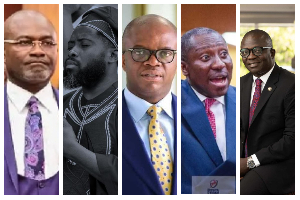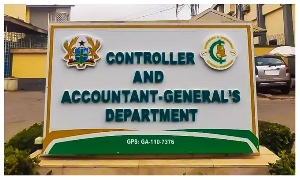Opinions of Sunday, 8 August 2004
Columnist: Asibey, Akwasi
Otumfuo: Following the Path of His Predecessors
I was dumbfounded when I read Honourable Agyare Koi Larbi?s letter to President Kufour in which he raised objections about the World Bank Group?s decision to give a grant of $30 million to the Asanteman Council. The grant will be used to support a water and sanitation project in about a 1,000 communities in four regions, namely Ashanti, Brong Ahafo, Central and Volta.
In a broader scheme of things, the success of Otumfuo in convincing the decision-makers at the World Bank to entrust such a huge undertaking to a traditional institution should have brought accolades and praises. But alas in our rush to be politically correct, our unguarded comments undermine our quest to build a pluralistic democratic society where our wants, needs, drive and entrepreneurship can be expressed without any hindrance.
What is even perplexing is that as a people, we fail to learn from the success of other countries where people from different races and ethnicity pursue individual and group aspirations without others feeling threatened or debased. Australia, Canada, United States and United Kingdom have in the last few years, fashioned political models, which have enabled people from different cultural backgrounds and ethnicity to co-habit and prosper.
There are some opinion leaders in our country that can be described as viscerally anti Asante. Such people do not hesitate, in public discourses and private conversations, to make disparaging remarks about Asantes. For example, there are some coastal chattering classes who persist in categorising Asantes as ?bush people?. They commonly refer to Asantes as ?habanase fo?, meaning not particularly cultured people. Yes Asantes are ordinary farmers but does that make them backward? Of course not! Today like other ethnic groups in our country, the sons and daughters of these farmers can be found in corporate boardrooms, international organisations and in government. They are proud of their Asante ancestry and equally proud Ghanaians. They are as sophisticated as any educated class in Ghana!
Contrarily to popular perceptions, Asantes have inordinate capacity to receive ethnic groups in their midst. This open door policy is so dear to Asantes that they have a popular saying that stipulates: ?Never ask about one?s roots?.
Although Asantes fiercely resisted European incursion into their fiefdom, they were not afraid to interact with Europeans and even sought to assimilate aspect of their culture that they thought could help advance their society. A Dutch author, Arthur Japin, has written a fascinating book called ?The Two Hearts of Kwasi Boachi? in which he recounts how King Kwaku Duah sent his nephew, Akwasi Boakye and his son, Kwame Poku to the Netherlands in 1830s to learn about modern European ways. The intention was for them to return to Asante to impact their newly acquired knowledge for the development of Asanteman. They arrived in the Netherlands illiterate but within a relatively short period of time, picked up the Dutch language and competed on equal footing with their peers in school. They faced humiliation and rejection but that did not dampen their quest for knowledge.
The exiling of Prempeh I on the Seychelles Island completed the modernisation of the Asante throne. He arrived on the island an illiterate but when he was returned to Kumasi in early 1920s, he had learned to read and write and had become an Anglican.
The Asante throne has been transformed and the various occupants of the throne have sought to continue the transformation and extending that to the rest of Asanteman and beyond.
Otumfuo Osei Tutu II is continuing that tradition, opening the minds of his people and helping to transform their lives in a meaningful way. As demonstrated by his predecessors, he would have done it with or without a president at the Castle who traces his footprints to his Kingdom!















